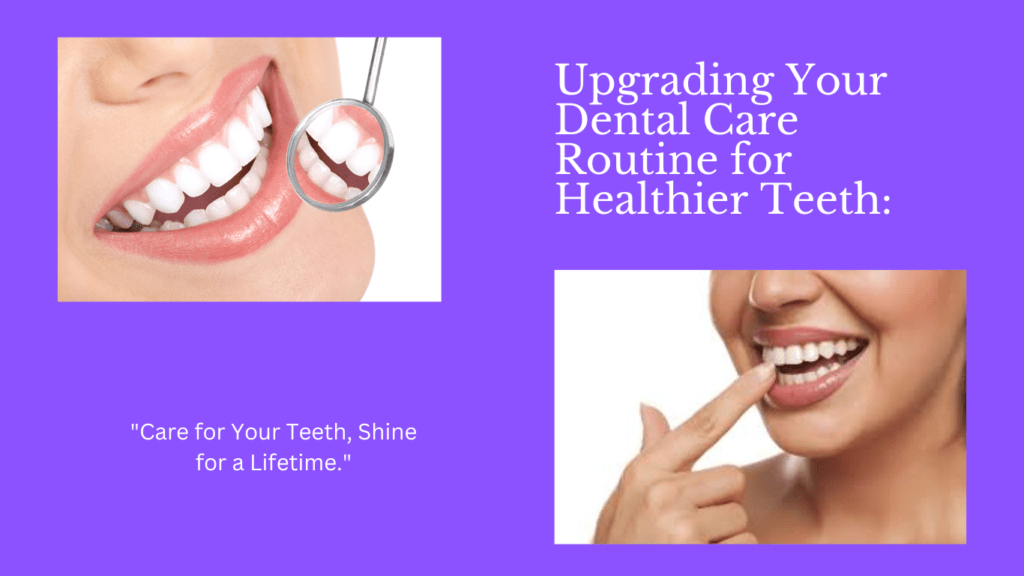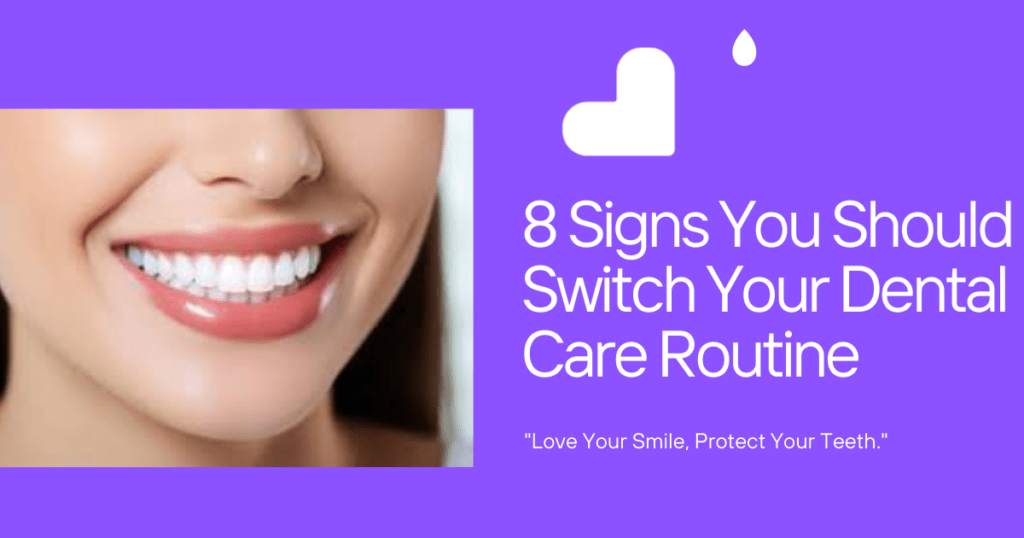Introduction:
- Dental Care Routine for your teeth and gums parallels the care you have for them on a daily basis. Brushing twice a day, flossing, and checkups can all be done regularly. But what do you do when the routine you’re accustomed to isn’t doing the trick? It is possible that a few small mistakes or unhealthy habits have created some problems: cavities, bad breath, or worse, gum disease. It is equally important to know when to change the oral Dental care routine. If your teeth start feeling sensitive, bleeding gums, or persistent bad breath, it may be time to switch things up. Maybe the correct techniques and tools make all the difference.We will enumerate eight signs that indicate you need to change your Dental care routine. The sooner you realize these warnings, the better you’ll start planning for your oral health protection and what will assure you a bright and confident smile.
Upgrading Your Dental Care Routine for Healthier Teeth:

This would ensure your smile shines brightly with health. Refine Your Habits: Here’s how you can redefine your oral care habits to healthier teeth:
1. Choose the Best Toothbrush:
You can upgrade your toothbrush very easily and effectively enhance your oral Dental care Routine. A soft-bristled brush will be the best way to avoid harming your gums and enamel. The electric toothbrush for a more profound clean is another option, since it removes more plaque and reduces inflammation in the gums.
2. Brush with the Right Technique:
Your brushing technique should be proper enough to safeguard your teeth and gums. Never brush back and forth; instead, use gentle, circular motions to clean every nook and cranny of your teeth, including your back molars and along the gum line. Brushing for two minutes twice a day will prove effective in removing plaque and prevent it from building up.
3. Never Skip Flossing:
Even in the daily Dental care routine of brushing, flossing has its place in the healthy care of your teeth and gums. Brushing alone can never go between your teeth where plaque and food particles seem to collect. Use floss daily to brush away debris and prevent cavities and gum disease. When conventional flossing becomes difficult, a simple solution is the water flosser.
4. Mouthwash in Your Routine:
The added protection that mouthwash provides for your teeth and gum tissue can be achieved by having incorporated in your dental care routine. Antibacterial mouthwashes break up plaque, help hinder bad breath, and fill areas that brushing and flossing may miss. Add a fluoride mouthwash to include extra cavity protection.
5. Stay Hydrate:
Proper water intake throughout the day rinses food particles and bacteria from your mouth. In addition, it promotes the production of saliva, which can effectively act to neutralize acids from your food and drinks, protecting your teeth against decay. Hydrate, especially after meals, to freshen and clean your mouth in book an appointment at the best dental clinic in chennai
6. Regular Dental Visits:
Even with the most frequent home dental care routine, there is no substitute for professional cleanings. Go see your dentist regularly (every six months) for cleanings and check-ups. He can remove tartar building up that brushing can’t touch, so keep an eye out for the early stages of cavities, gum disease, or even oral cancer.
7. Use Products for Your Specific Needs:
Tailor your dental care products to your specific needs. If you’re sensitive, try a desensitizing toothpaste. To minimize bad breath, consider a mouthwash or toothpaste that contains an antibacterial agent. For anti-cavity purposes, consider buying a toothpaste with a greater level of fluoride, or consult your dentist on whether you would benefit from prescription fluoride toothpaste.
8. Change Your Diet:
What you consume determines your oral health. Reduce your sugar and acidic intake-it eats holes in your mouth, making erosion of the enamel of your teeth worse. Instead, consume more calcium-based foods like cheese, nuts, and fresh vegetables that naturally clean out your teeth and help keep healthy gums and teeth.
8 Signs You Should Switch Your Dental Care Routine:

1. You Bleed When You Brush or Floss Your Gums:
You bleed during the brushing or flossing process. This is usually because you are overbrushing or insufficiently flossing. Or it could be an early sign of gum infection. Brush using a soft toothbrush and ease. Be certain to floss every day and visit your dentist if this does not cease.
2. Your Bad Breath Persists for a Long Time:
If the bad breath persists even after brushing, flossing, and rinsing with mouthwash, it could be due to poor cleaning during your Teeth care routine. Try to get rid of bacteria on your tongue by using a tongue scraper. If it still doesn’t help, visit your dentist for more serious problems such as gum disease or cavities.
3. Sensitivity in the teeth:
If your teeth hurt when eating hot or cold foods, it may be a sign that your tooth enamel is wearing away or your gums are receding. Try using a toothpaste for sensitive teeth. Avoid brushing too hard. If it does not get better, ask your dentist for advice.
4. Yellowing or Stained Teeth:
Your teeth have yellowed or stained, maybe by food and drink such as coffee. You might need a whitening toothpaste or to visit a dentist for professional whitening to get rid of the stains. Another solution is to reduce the intake of foods and beverages that stain your teeth.
5. Plaque and Tartar Build-up:
If you still have plaque-a sticky film-on your teeth after brushing, you need to brush better or more often. An electric toothbrush is the best way for cleaning better. Don’t forget to floss to clean between your teeth.
6. Toothaches or Gum Pain:
If you go through frequent toothache or gum sore, then you might be suffering from a cavity or gum condition. And if your daily Dental care routine does not stop the pain, then you must see your dentist for an evaluation and diagnosis of the cause.
7. Worn or frayed toothbrush bristles:
Well, if your toothbrush bristles are already worn or frayed, you have to replace that toothbrush now with your dentist. Your toothbrush will work only for about 3-4 months or sooner if the bristles appear worn out. A worn-out toothbrush won’t clean your teeth.
8. You Haven’t Updated Your Routine in Years:
If the old dental care routine products and techniques that have been used for years are still in use, then maybe it is time to upgrade. Using an electric toothbrush, a water flosser, or fluoride toothpaste is advisable to start using in improving your dental care routine.
Conclusion:
- In short, one of the important needs for maintaining optimum oral health is detection of the time to change dental care routine. These signs such as bleeding gums, bad breath, or tooth sensitivity often suggest that your routine is not up to the mark as it may be.
- But with the aid of proper products and equipment, like methods, you can also prevent the risk that perhaps you would have other worse issues in the future. If you transition to a softer toothbrush, start flossing, or get into regular appointments with your dentist for proper cleanings, these transitions will all lead you to healthier teeth and gums.
- By doing some proactive work and working on change, you would improve your smile, thereby contributing to the well-being of your entire body. Periodic changes in dental care routine will ensure that you have been taking good care of your teeth.
“Your Dream Smile Awaits! Book an Appointment Now”
Other Links To Know : Top 10 best dental clinic in Chennai , Pediatric dental treatment Ensure Your Child’s Dental Health, Root canal cost in Chennai.
